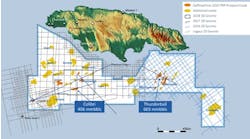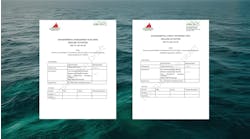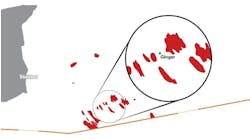Win ThorntonWhat do we do with offshore platforms when they cease to produce? Previously, the answer was to abandon and dispose of them. Now, since the Brent Spar, we decommission them. Different name, same result. By changing the name, we have hoped that some of the public scrutiny and bad connotations would go away.
President
WINMAR Consulting Services
As an industry, we are in a state of denial concerning decommissioning. We ignore many of the issues. We budget and plan our projects without a complete appreciation of the technical, political, or regulatory constraints. It seems that in the last decade, our only real accomplishment has been in calling abandonment "decommissioning." The real substantive and technical issues are still there and waiting concerted industry effort. These issues include:
- Perspective and Awareness: Our corporate mindset and technical training do not foster an awareness of decommissioning issues. Our engineers are trained to drill, develop and construct, not decommission. We, as an industry, need to change this perspective and foster an awareness of decommissioning that can be applied to our everyday engineering activities.
- Design for Decommissioning: Platform details have not changed in the last decade to facilitate decommissioning. We all do constructability reviews of major projects, but have you ever seen a de-constructability study? We need to realistically address decommissioning during our design efforts, for both shallow water and deepwater structures.
- Design for Re-use and Recycling: Most platforms are not designed specifically for re-use or recycling. The auto industry has made great progress in designing for recycling. We need to follow their lead and plan for re-use and recycling when designing platforms. This is real value-added engineering than can be realized during the investment recovery process.
- Decommissioning Liabilities: Each operator is responsible for determining it's decommissioning liabilities. This is the basis for accruing the necessary financial reserves from production for decommissioning. These estimates need to be prepared based on accurate platform inventories that define features, condition and challenges. The costs must be based on realistic assessments of decommissioning tasks, costs, timing, regulations, equipment availability, disposal options and, salvage value.
- Deferring Decommissioning: The decommissioning strategy of many operators can be stated in three words; defer, defer, and defer. It is perceived as the solution to the budget balancing process. There are real costs and risks associated with deferral, which increase with deteriorating condition. A case-in-point occurred while inspecting a platform that had been shut-in for eight-plus years. The field was held by production from another facility. The platform was in very poor condition. While walking across a rusty, debris strewn cellar deck, a 2-ft square section of deck plate gave way under my feet. Thank goodness, my shoulders were wider than the hole or I would have fallen 60 ft to the water. Was this a near death experience for me or the system? We need to prudently decommission platforms when production ceases. If we defer, we need to properly maintain the platforms and account for the increased removal cost and risk.
- Transfer of Liability: Some operators apply an alternative strategy to deferral - if it is time for decommissioning, try to sell it. Some operators believe they can transfer the decommissioning liability to others at a savings to themselves. This may be a fallacy. If the operator transfers the liability for less than the real costs, they should be cautious because the property may end up back in their lap if the new operator defaults on their decommissioning obligation. If the operator transfers the liability for more than the real costs, they paid too much and may have been better off handling the decommissioning responsibility themselves.
- Deepwater Decommissioning: In the US Gulf of Mexico, the decommissioning regulations for 100 ft water depths and 1,000 ft water depths are the same. The regulations require complete removal and site clearance activities to be performed on all platforms, whatever the water depth. We believe that some operators still erroneously consider that partial abandonment or abandonment in-place is an available option in deepwater.
- Rigs-to-Reefs: In the Gulf of Mexico, Rigs-to-Reefs has been a popular disposal option. Industry has been able to establish over 100 reef sites to maintain this important habitat. Extending this disposal option to deepwater or other geographic areas will require substantiation with the proper science. Industry must be willing to fund this work with adequate lead time to provide quality results. If these sites prove viable as habitat, then industry must also be willing to share the real savings with the appropriate reef programs.
- Lingering Liability: In the Gulf of Mexico, most pipelines have been abandoned in-place after receiving a waiver of the complete removal requirements from the MMS. The waiver states "However, in the future, should it be determined that this abandoned pipeline constitutes a hazard to navigation or commercial fishing operations or unduly interferes with the other uses of the Outer Continental Shelf, operator shall be required to remove it." Is the liability really gone when we are done?
- Public Perception: Public scrutiny of decommissioning is increasing. We must be responsible for our commitments, and diligent in educating the public when we wish to try alternate decommissioning or disposal options.
Copyright 1998 Oil & Gas Journal. All Rights Reserved.


